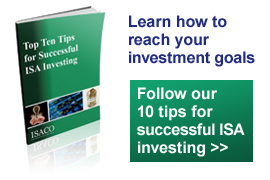 In the second blog of this series we'll look at how you can create an income for life by investing in growth funds.
In the second blog of this series we'll look at how you can create an income for life by investing in growth funds.
In our first post we looked at how ever increasing life expectancies could see some people running out of capital in retirement and how investing for growth could offer a solution.
When investing for growth, many people seek out funds suited to more adventurous investors. These types of funds can be extremely volatile in the short-term but, when held over the long-term, they have the potential to reap impressive returns. Some growth funds invest in overseas markets and may be affected by changes in currency exchange rates, which may affect the value of an investment. Investing in growth funds that focus on small and emerging markets may be more volatile than those in more developed markets. Before considering purchase, I suggest you seek expert guidance to ensure suitability and always ensure you read the full prospectus and the Key Investor Information Document (KIID). The Key Investor Information Document is sometimes called a Simplified Prospectus.
Investing in these types of funds is not for the faint hearted and is aimed at investors who have at least ten years as their investment horizon. A person therefore investing in these types of funds would be putting themselves at risk if they had a goal that was less than five years. Most investment funds, irrelevant of their quality status, move in the same direction as the general market. This means when the market corrects, funds correct. Corrections can last anything from one week to two or even three years and that’s why a long-term view is essential.
Past performance in a different light
Investors are constantly reminded that past performance is no indication of what will happen in the future, however when you view past performance in a different light, it may help give you an edge when choosing the best funds to buy. When choosing the best funds to invest in, sophisticated investors think in probabilities rather than certainties.
Nothing is guaranteed when investing in the stock market, which means retail investors need to do all they can to increase the probability that the manager of the fund they choose is ‘likely’ to continue to perform well in the future. When seeking higher returns over the long-term, my suggestion would be to aim to find fund managers with excellent track records. This approach works for me and may work for you but there is no guarantee it will always produce a positive result. When the market is in a confirmed uptrend, I scan for funds managed by exceptional fund managers. I like to ensure that the fund manager has proven they he or she can beat the market in the short and the long-term.
You need a benchmark when investing for growth
If you followed a similar strategy to mine, your aim would be to make sure the person managing the fund has outperformed the market in the long-term and in the short-term. How? You need to compare the manager’s performance versus a benchmark such as the FTSE 100, the S&P 500 or the Nasdaq Composite. About 90% of fund managers underperform the S&P 500, which has averaged over the long-term 13% per year. Returning 13% on average every year is an impressive return and probably the main reason why so many fund managers fail to beat it. Even though 90% fail to beat the market, 10% do beat it and these are the fund managers I like to focus on.
When looking for a quality fund manager, I discover if the fund manager has good long-term performance and the way to do that is by comparing the manager’s annual returns with the Nasdaq Composite's annual returns. When trying to determine how good a fund manager is, I measure what they’ve returned each year against the Nasdaq Composite. Ideally you want to see the fund manager beat the Nasdaq. For example, because the Nasdaq made a 43.9% in 2009 and a 16.9% gain in 2010, you look for fund managers who returned better than 43.9% in 2009 and better than 16.9% in 2010.
Searching for the Alex Ferguson of the fund world
When I find outstanding fund managers I often notice that they not only beat the market in one year, they beat it in multiple years and that means beating the market was not achieved by luck. When I find exceptional managers, I assume the manager could be an Alex Fergusson of the fund world. Because the manager has achieved a great track record, the probability that they are going to continue to perform well in the future, in my opinion, is high.
As well as looking at how these fund managers have performed year on year (long-term) I like to make sure the fund manager is outperforming the market in the short-term. The short-term analysis allows me to see which managers are really in sync with the market. The best ones will be the ones that are holding the markets leading stocks and when I look at their recent short-term performance, I generally see that they have been outperforming the Nasdaq.
Invested in the money flow
Most fund managers are unfortunately heavily restricted. Each fund manager has a fund mandate. The mandate is a statement of the fund's aims, the limits within which it is supposed to invest and the investment policy it should follow. As part of this mandate, a fund will have to define what countries or regions it will invest in and what sectors it will invest in. Fund mandates are set by the fund management company, but publicised so that investors can choose a fund that suits their requirements.
Having a mandate puts managers at a disadvantage, because the big money can only flow into a handful of countries/sectors rather than it flowing into every country in the world and every given sector. I am fortunate to have the luxury of being flexible, nimble and totally unrestricted. It means our clients and I can invest anywhere in the world and that means we are never tied to any one fund or fund manager. Our only concern is to be invested in the money flow. Our mantra is to invest with star performing managers who hold stocks where the big money is flowing right now. These are the fund managers we class as being in sync with the market. These are funds controlled by a manager who has not only proved they can beat the Nasdaq in the long-term, they are also beating the Nasdaq in the short-term.
In the final post in this series we'll look at 5 key steps to creating an income for life.
As always, if you have any questions or thoughts on the points I've covered, please leave a comment below or connect with us @ISACO_ on Twitter.
Please note past performance should not be used as a guide to future performance, which is not guaranteed. Investing in Funds should be considered a long-term investment. The value of the investment can go down as well as up and there is no guarantee that you will get back the amount you originally invested.
About ISACO
ISACO was established in 2001 by brothers Stephen and Paul Sutherland. Our personal investment service allows you to buy the same funds as our star-performing investor. You find out where he invests, keep full control of your account, enjoy a close relationship with a trusted expert, and benefit from the potential for attractive long-term returns.
For more information about ISACO and our personal investment service, please read our free brochure.














